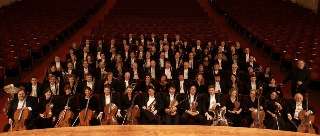|
Back
Honeck’s Jihad: the Demontage of Mozart’s Requiem Vienna
Musikverein
11/01/2012 -
Herbert Willi: ABBA-MA, Echo of Peace – Sacrosanto (world premiere)
Wolfgang Amadeus Mozart: Requiem, KV 626 – Maurerische Trauermusik, KV 477 – Vesperae solennes de confessore: “Laudate Dominum”, KV 339 – Ave Verum, KV 618
Gregorian Chant
Readings from St. John, a Mozart Letter, Nelly Sachs poetry,
Church bells
Nikolaj Znaider (violin), Sunhae Im (soprano), Gerhild Romberger (alto), Paul Appleby (tenor), Liang Li (bass), Michael Heltau (speaker)
Choralschola of the Vienna Hofburg Chapel, Daniel Mair (chorus master), Vienna Singverein, Johannes Prinz (chorus master), Pittsburgh Symphony Orchestra, Manfred Honeck (conductor)

The Pittsburgh Symphony Orchestra (© Michael Sahaida)
The publicity for this concert of the Pittsburgh Symphony Orchestra at the Vienna Musikverein read: Mozart: Requiem. Instead, the audience was coerced into sitting through a “demontage” of Mozart’s most treasured masterpiece. Mozart’s Requiem was diluted with church bells, Gregorian Chant, the Maurerische Trauermusik, the Laudate Dominum and Ave Verum, readings from the Scriptures etc. This was Mr. Honeck’s personal Jihad. One wondered whether one was in a concert hall or at an Opus Dei ceremony.
As is well known, Wolfgang Amadeus Mozart’s relationship with the Catholic Church was ambivalent at best. He was in fact forced out of his native Salzburg by Archbishop Hieronymus Colloredo, who refused to recognize his genius.
It is also well known that Mozart died in utter poverty. His was a pauper’s funeral at St. Marx’s cemetery outside the old city of Vienna, without any of the burial trappings Mr. Honeck’s program notes profess he received.
Though Mozart died before he could fully complete his Requiem, this masterpiece has for centuries been cherished as his Opus summum viri summi. The universal genius with which this timeless work depicts the human experience of life and death transcends every narrow confine of religiosity and dogma. Mutilating the work as Mr. Honeck did was distasteful and hurtful.
It was a pity to have had to endure readings from the Scriptures over a poorly adjusted microphone, instead of enjoying the excellence of the Pittsburgh Symphony Orchestra. The strings of the PSO, led by their young concert master Noah Bendix-Balgley, clearly possess an extraordinary Spielkultur. The quartet of vocal soloists lacked homogeneity. The Vienna Singverein Chorus sang with their customary routine.
The concert began with Herbert Willi’s ABBA-MA, Echo of Peace for chorus and orchestra. Austrian composer Willi, born 1956, used the same rhythmic clusters from his 6 minutes fanfare-like prayer in his violin concerto Sacrosanto that followed. It was the world premiere of this concerto, commissioned by the Gesellschaft der Musikfreunde Vienna and dedicated to Nikolaj Znaider. Rhythmical elements alternated with lyrical, folkloristic elements and swing. Znaider played the demanding solo part with conviction. His powerful playing is always a pleasure to listen to.
The Pittsburgh Symphony Orchestra
Wiebke Kuester
|